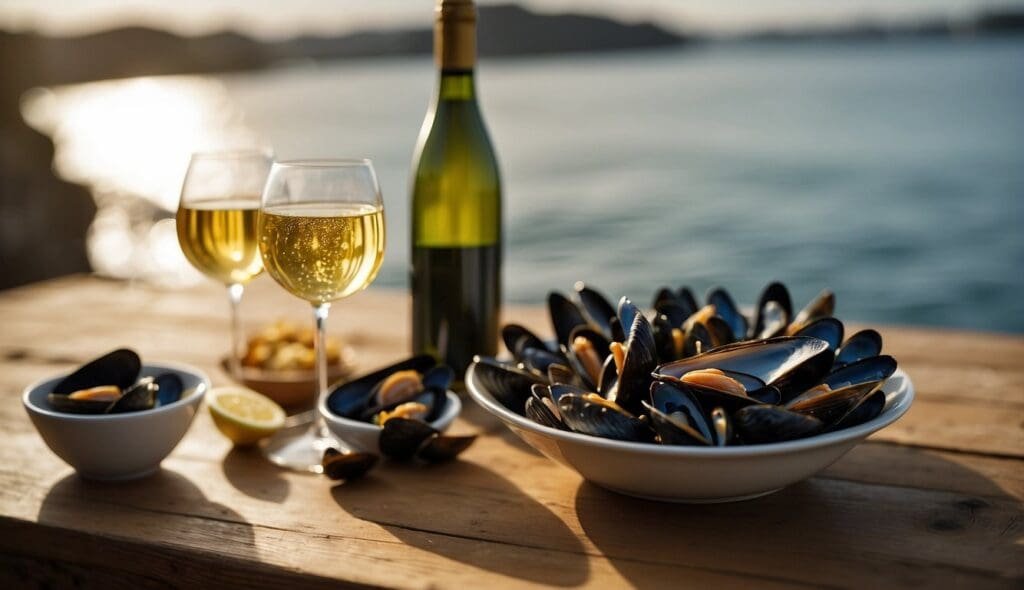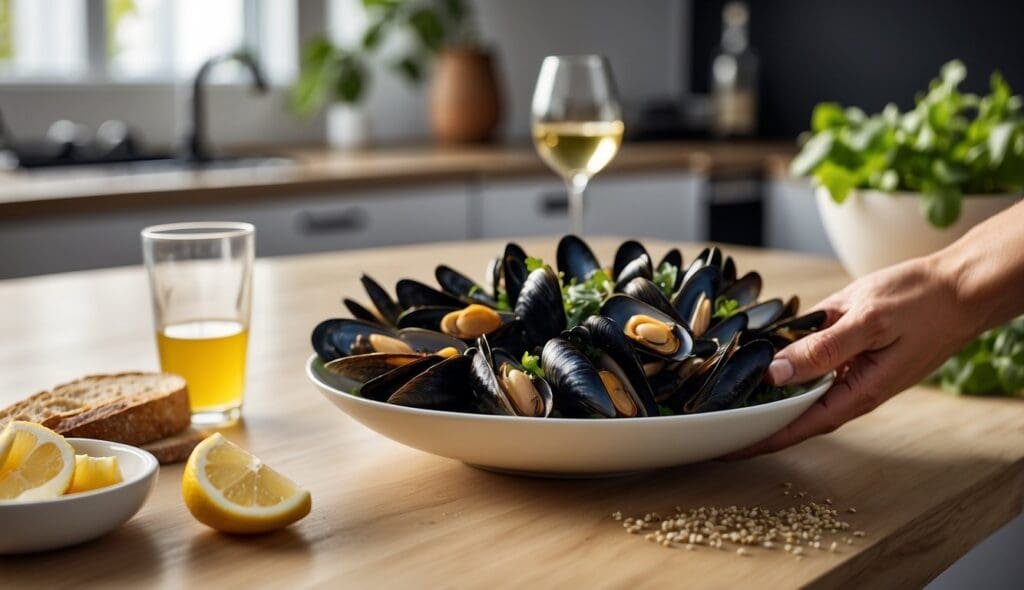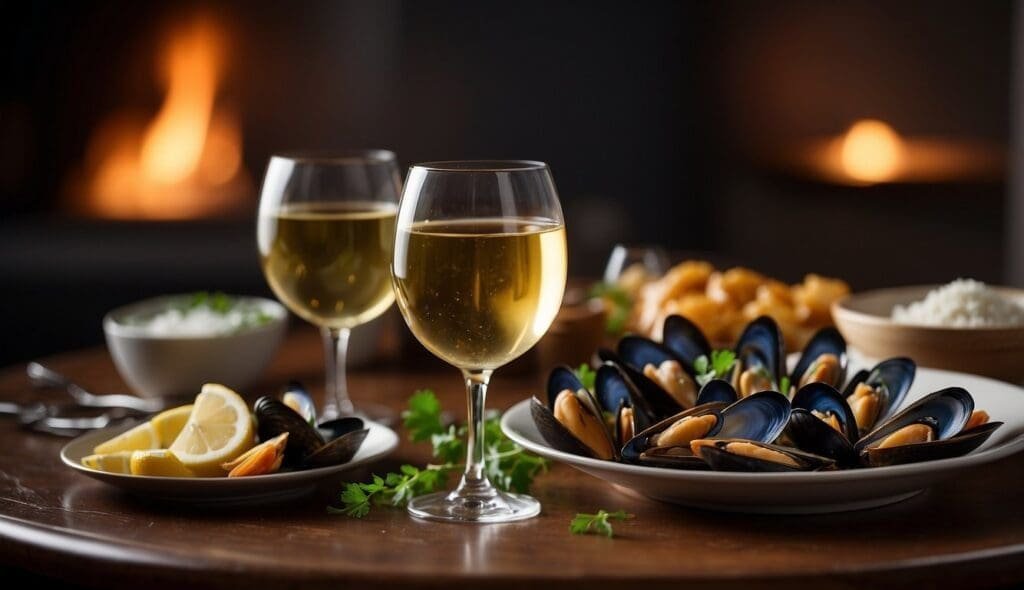This post may contain affiliate links. Please read my disclosure policy.
Which white wine for mussels you ask, you want a wine that complements the delicate seafood flavours without overpowering them.
Sauvignon Blanc from regions like Adelaide Hills offers a bright acidity that elevates the natural sweetness of mussels. You’ll find that the herbal notes of Sauvignon Blanc create a harmonious balance with the dish.

Another excellent choice for pairing white wine with mussels is a crisp Pinot Grigio. Look for options from the Mornington Peninsula, known for its light and refreshing taste. This type of white wine ensures that each bite of mussels remains the main attraction while enhancing the meal with its subtle notes.
If you’re feeling adventurous, try a glass of Riesling from the Clare Valley. This wine, with its hint of sweetness and vibrant acidity, can add a unique twist to your mussels dish.
The interplay between the citrusy notes of the wine and the garlic and chilli typically used in mussel recipes creates a dining experience you won’t forget.
Selecting Which White Wine for Mussels

When choosing a white wine for mussels, consider the flavour profile you wish to achieve. Dry white wines from Australia are excellent options due to their crisp and bright characteristics.
The Best White Wines for Mussels
To enhance your mussel dish, select white wines that offer a balance of acidity and fruitiness. Sauvignon Blanc is an ideal choice. It has a crisp, clean taste that pairs well with seafood. Opt for a Sauvignon Blanc from the Margaret River region for its vibrant citrus notes.
Pinot Grigio is another great choice. This wine has a light body with a hint of green apple and pear. Look for Pinot Grigio from the King Valley region, known for its well-balanced acidity.
Chardonnay, specifically unoaked, can also work well. The Barossa Valley produces excellent unoaked Chardonnays that offer a buttery yet crisp flavour, which complements the delicate taste of mussels.
Dry White Wines for Cooking Mussels
When cooking mussels, you want a dry white wine that doesn’t overpower the dish. A Semillon from the Hunter Valley is perfect. It has a subtle flavour with a good acidity level, ideal for creating a light and aromatic broth.
Riesling is another excellent dry white wine for cooking mussels. Choose a dry Riesling from the Clare Valley. This wine adds a touch of citrus and green apple aroma without overpowering the natural flavours of the mussels.
Vermentino, specifically from the McLaren Vale, is a good option. It possesses a zesty lemon flavour and a refreshing finish, making it a superb choice for enhancing the dish’s freshness.
Wine Pairing Principles for Mussels

When choosing white wine for mussels, it’s important to balance flavours and ensure the wine doesn’t overpower the dish. This involves looking at the acidity and body of the wine, as well as the preparation of the mussels.
Balance and Complementarity
To balance and complement the flavours of mussels, select a wine with crisp acidity and light body. Steamed mussels, often paired with a simple broth, work well with wines like Muscadet, Chablis, or Sauvignon Blanc. These wines have a neutral profile that won’t overshadow the delicate taste of the mussels.
For mussels cooked with richer ingredients like butter or cream, go for wines with more body such as Viognier or Chardonnay. An Australian Semillon can also be a great choice, providing a fuller palate while still keeping the balance.
Pairing wines that highlight the dish’s characteristics helps to elevate the dining experience. When mussels are prepared with garlic or herbs, an Australian Vermentino adds a zesty and aromatic element, enhancing the overall taste.
Avoiding Wine Overpowering
It’s crucial to avoid selecting a wine that overpowers the natural flavours of the mussels. Strongly oaked or very sweet wines can dominate the dish, masking the subtle sweetness of the mussels.
Choose wines with moderate alcohol content, as high alcohol levels can clash with the briny and sweet notes of the seafood. Varieties such as Unwooded Chardonnay from Australia or a Grüner Veltliner offer bright acidity without overwhelming the dish.
When preparing mussels with spicy or heavily seasoned sauces, look for a wine that balances the intensity, like an Australian Riesling. This ensures the flavours meld harmoniously, rather than one element overshadowing the other.
Cooking Mussels with White Wine
White wine is an excellent choice for cooking mussels, adding a light and fresh flavour to the dish. Let's explore some popular recipes and variations to keep your mussel dishes exciting.
Recipes and Techniques
Different recipes for cooking mussels with white wine may use slightly different techniques. A common method begins by sautéing garlic and onions in butter. Once they are fragrant, add a dry white wine such as an Australian Chardonnay or Sauvignon Blanc, which enhances the flavours.
Let the wine simmer for a few minutes until the alcohol evaporates. Add the cleaned mussels, cover the pot, and steam until the mussels open, which typically takes about 5 to 6 minutes.
This approach can be seen in recipes like Quick and Easy White Wine Garlic Mussels or Steamed Mussels in White Wine Broth. For an extra kick, some chefs add lemon juice and fresh herbs such as parsley or thyme.
Alternative Cooking Liquids
Although white wine is the traditional choice, you can experiment with other cooking liquids to alter the flavour profile of your mussels. One interesting option is a combination of white wine and seafood broth.
Adding seafood broth can enhance the dish's oceanic flavour. You could also try using dry vermouth instead of white wine, which offers a slightly sweeter and herbaceous taste.
When substituting white wine, keep the cooking technique the same. Sauté the aromatics first, then add your chosen liquid, followed by steaming the mussels. For those who prefer non-alcoholic options, white grape juice or apple juice can be good substitutes. Adjust the other ingredients to ensure the dish remains balanced and delicious.Frequently Asked Questions
Choosing the right white wine for mussels can elevate your dish. From cream sauces to tomato-based dishes, specific varietals work best in different recipes. Here are some answers to common questions about pairing white wine with mussels.
Which type of white wine should be used in a cream sauce for mussels?
For a cream sauce, Chardonnay is an excellent choice. It adds a buttery richness that complements the creaminess. Consider using an Australian Chardonnay for its balanced acidity and fruit notes.
What is the ideal white wine to add to garlic and mussels?
When cooking mussels with garlic, Riesling is a great match. An Australian Riesling brings a touch of sweetness and acidity that enhances the garlic flavour without overpowering it.
Can you recommend a white wine for a tomato-based mussels dish?
For a tomato-based dish, Vermentino works well. This Italian-origin wine, now also produced in Australia, offers crisp acidity and citrus notes that cut through the tomato’s richness.
What are the best white wine options for making mussels in a pasta sauce?
Sauvignon Blanc is a versatile option for mussels in pasta sauce. An Australian Sauvignon Blanc provides bright, zesty flavours and herbaceous notes that complement the dish beautifully.
Which white wine varietal enhances the flavour of seafood when cooking?
Semillon is an excellent choice for enhancing seafood. Australian Semillon, known for its citrus and honeyed notes, brings out the natural sweetness of mussels and other seafood.
Is there a preferred Sauvignon Blanc for use in mussel recipes?
Look for an Australian Sauvignon Blanc from Margaret River. These wines are known for their high acidity and tropical fruit flavours, perfect for pairing with mussels.
User Review
( votes)Sip smarter, subscribe now!
Subscribe for gourmet tips, event updates, travel ideas, and a free e-book on Food Pairings. Start your journey to culinary and travel excellence!













